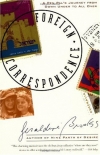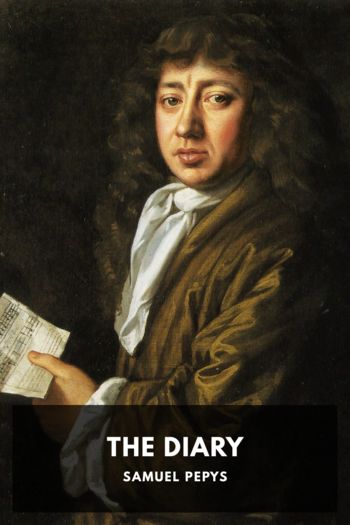Foreign Correspondence: A Pen Pal's Journey by Geraldine Brooks (finding audrey .TXT) 📗

- Author: Geraldine Brooks
Book online «Foreign Correspondence: A Pen Pal's Journey by Geraldine Brooks (finding audrey .TXT) 📗». Author Geraldine Brooks
As my father takes the photograph, his eyebrows rise in surprise, as if it is something he didn’t expect to find. He says quietly, “That’s Ruby. She’s someone I knew in America.” He is about to say more but thinks better of it. He places the picture in his pocket and goes on shuffling papers. Thirty years later, when I sort through the tea chests that contain his life’s memorabilia, that photo is nowhere to be found.
• • •
Gloria learned all about Ruby during that tram ride in 1946, along with other names that were never discussed again. The week after she accepted his proposal, she was quietly taken aside by my father’s fellow musicians, all of whom warned her that, while Lawrie was “the best mate a bloke could have,” she’d be out of her mind to marry him.
But they underestimated her. Not long after their marriage, my parents began a quiet withdrawal from the turbulent show business world. By the time I was five, they had turned their backs on it with stunning thoroughness. Relics of that old life lay in my dress-up cupboard. There were my father’s buttery-soft black silk shirts and stiff moiré cummerbunds; my mother’s shimmery, hand-beaded evening dresses and fur-trimmed pillbox hats. But the splendid creatures who had worn these clothes existed for me only in the pages of our photo albums. The father I knew wore serviceable polyester. My mother never seemed to think about clothes at all.
The last step in their retreat from celebrity came when my father ended his thirty-year singing career. When friends asked about his decision to quit, my father laughed and said that fifty-four was old enough for a pop singer. But he still looked uncannily youthful. My mother used to joke that she needed every day of the twelve-year gap in their ages.
The friends who questioned his decision had seen the handsome tuxedoed man and heard the soaring voice. What they hadn’t seen was what came before the performances, or what came after.
Perhaps nothing unnerves a child so much as perceiving fear in a parent. Before my father went off at night to singing engagements I would crawl under the dressing table to play with the box of studs and shiny cuff links he wore with his tuxedo. When I noticed his hands shake as he tied his bow tie, my own four-year-old stomach would contract with dread. Lawrie Brooks, who had sung before thousands, had stage fright. As he kissed me goodbye at the door, he would be trembling. I was asleep long before he returned. But in the middle of the night I would wake to hear him in the bathroom, retching.
After he gave up singing, Lawrie became a creature of unalterable habit, as if he needed a rock-solid routine to compensate for all the chaos that had come before. Nothing was too minute to have a set of rules. Old soap scraps had to be molded into the new bars with sculptural precision. Forks had to be washed up first. In the fruit bowl citrus had to be quarantined from other fruit lest it hasten rotting.
The quotidian round of work, pub and domesticity somehow seemed to be enough to make up for the loss of music in his life. For me, it meant that I heard his wonderful voice mostly on the old 78rpm records we kept in a cupboard. It was a tall stack—sixty recordings in all, from corny Hawaiian tunes such as “I’ve got a little grass skirt for my little grass shack in Hawaii,” to Irish-tenor ballads and his own favorites—the jazz improvisations in which the glide of his voice eased around the notes of the clarinets and saxophones as if it were just another instrument under a musician’s expert control.
Sometimes, when he came to church for someone’s wedding or confirmation, he would join in singing a hymn. I loved to watch the heads turn as his rich tenor soared into the church’s high dome, drowning the woolly chorus of ordinary voices.
I started school the year my father stopped singing. It was a scorching midsummer day at the end of January, and the blue cotton of the new school tunic prickled me all over. Even under the big straw brim of the school hat, the sun’s dazzle hurt my eyes. The empty brown school case felt heavy as it banged against my aching knees.
I was in the playground at morning recess when my mother and father arrived to take me home. The doctor had called them with the results of a test that showed I had serious blood anomalies. The illness had no precise diagnosis, but the doctor suspected rheumatic fever. To reduce strain on my heart, he said, I wasn’t to be allowed to walk at all. So my father carried me the seven blocks home. My mother called in the country’s preeminent pediatrician, Sir Lorimer Dods. This tall, silver-haired gentleman was as baffled as the local doctor. He ordered me to stay in bed and lie as still as I could. For more than a month I wasn’t allowed to get up even to go to the toilet.
The next three years passed in a blur of recurring fevers, where familiar voices echoed unrecognizably and synesthesia made my father’s jazz records pour over me in bands of bright chrome yellow. Since then, my father’s beloved jazz has been the only kind of music I can’t bear, and certain tones of yellow make me feel as if I’m running a temperature of 103.
When I knew I was becoming ill again, I dreaded breaking





Comments (0)